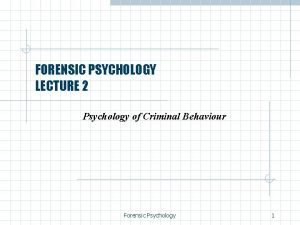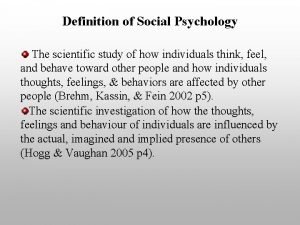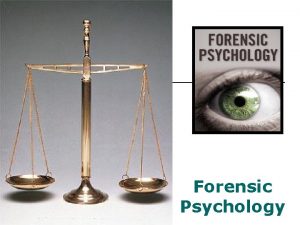Forensic Psychology What is forensic psychology Forensic psychology




















- Slides: 20

Forensic Psychology

What is forensic psychology? • Forensic psychology is the intersection between psychology and the justice system. • It involves understanding fundamental legal principles, particularly with regard to • • Expert witness testimony Competence to stand trial Child custody and visitation Workplace discrimination Determining insanity Malingering determinations Creating a criminal profile

Careers in Forensic Psychology Requires a Ph. D or a Psy. D in clinical or counseling psychology. Few colleges offer joint Law/Psychology degrees in graduate school. (UVA and UAZ) Salaries within forensic psychology can range greatly depending on the sector of employment – Entry-level positions for those with a doctorate degree start out between $60, 000 and $70, 000 – Average national salary forensic psychologists in 2013 was around $75, 000 with a low-end range of around $35, 000 and a high-end range at around $124, 000 • Individuals with a bachelor's or master's degree generally hold the title of psychological assistant or psychological associate. Starting level salaries for these positions generally start around $35, 000 or $40, 000. Those in private practice who offer consulting services typically earn more, often in the $85, 000 to $95, 000 range •

Criminal Profiling • Profiling—one of the tasks often associated with investigative psychology—requires sketching the significant psychological and demographic features of a person or persons. • Broadly defined, investigative psychology includes research and practice involving: -Profiling -Police Line-ups -Risk Assessment -Interrogation -Polygraph

Criminal Profiling • Criminal profiling is the process of identifying personality traits, behavioral tendencies, geographical location, and demographic or biographical descriptors of an offender (or offenders) based on crime scene characteristics.

Criminal Profiling • The primary goal of profiling is to narrow the field of possible suspects. • Profiling is also a form of prediction -- the profiler tries to “predict” who the offender or offenders might be and where and how the next crime may occur.

Criminal Profiling • Crime scene reflects the personality of the offender. • M. O. remains similar. – Modus operandi/Mode of Operation – Criminal’s patterns • Signature will remain the same. • Offender’s personality will not change.

Types of Murderers • Serial Killers – A minimum of three to four victims, with a "cooling off" period in between – The killer is usually a stranger to the victim — the murders appear unconnected or random • Mass Murderers – The FBI defines mass murder as murdering four or more persons during an event with no "cooling-off period" between the murders. • A mass murder typically occurs in a single location where one or more people kill several others. Many acts of mass murder end with the perpetrator(s) dying by suicide or suicide by cop

Serial Killer Stats • • • The US has 76% of the world's Serial Killers Europe, in second, has 17% 84% of American killers are Caucasian 16% are Black Men make up at least 90% 65% of victims are female 89% of victims are Caucasian 44% of all killers start in their 20's 26% in their teens 24% in their 30's Out of all the killers, 86% are heterosexual


The Organized Crime Scene • Offense planned • Victim a targeted stranger • Victim personalized (photographed) • Controlled conversation • Crime scene reflects overall control • Demands submissive victim • Restraints used • Aggressive acts prior to death • Body hidden • Weapon/evidence absent • Victim or body transported from scene • Associated with psychopathy

The Disorganized Crime Scene Spontaneous offense Victim or location known Depersonalizes victim Minimal conversation Crime scene random and sloppy • Sudden violence to victim • • • Minimal use of restraints Sexual acts after death Body left in view Evidence/weapon often present • Body left at death scene • Associated with Psychosis • •

Infamous Serial Killers David Berkowitz AKA Son of Sam • Known as the Son of Sam or the. 44 Caliber Killer, David Berkowitz carried out a series of shootings in the summer of 1976. Using a. 44 caliber Bulldog revolver, he shot 6 people dead and wounded 7 others. Berkowitz sent a series of taunting letters to police and the press promising further shootings, terrorizing the people of New York City. Eventually captured in August 1977, Berkowitz confessed to all of the killings and was sentenced to 25 years to life in prison for each murder, to be served consecutively and is unlikely ever to be released.

Infamous Serial Killers Dennis Rader AKA the BTK Killer • Dennis Raider murdered 10 people in Sedgwick County, Wichita, Kansas between 1974 and 1991. Obsessed with notoriety, Raider sent taunting letters to police under the name BTK which stood for ‘Bind, Torture, Kill’. Rader stalked his victims before breaking into their homes, then binded their limbs before strangling them. Having disappeared in 1988, BTK remerged 2005 when he sent a floppy disc to the press which was to be his downfall. Tracing him via the floppy disc, Rader was arrested and charged upon which he immediately confessed. He is serving 10 consecutive life sentences with an earliest possible release date of February 26, 2180.

Infamous Serial Killers Jeffery Dahmer • Known as the Milwaukee Cannibal, Jeffrey Dahmer was an American serial killer and sex offender who raped, murdered and dismembered 17 men and boys between 1978 and 1991. He also committed necrophilia and ate parts of his later victims, dismembering and cooking parts of their bodies within his home. Dahmer was eventually caught after a would-be victim managed to overpower him and alert police. In 1992 Dahmer was convicted of 15 of the murders and sentenced to 15 terms of life imprisonment. However just two years into his sentence he was beaten to death by a fellow inmate at the Columbia Correctional Institution.

Infamous Serial Killers Ted Bundy • One of the most widely known murderers of the 20 th century, Ted Bundy was an American serial killer and rapist who kidnapped or overpowered numerous young women and girls during the 1970 s. Bundy typically approached his female victims in a public place and led them to secluded areas where he would sexually assault and kill them. He decapitated at least 12 victims and kept the severed heads in his apartment as trophies. Repeatedly captured, he twice managed to escape from police and court houses before going onto commit three further killings. Convicted of multiple murders he sentenced to death. He was executed by the electric chair in 1989.

Infamous Serial Killers John Wayne Gacy AKA The Killer Clown • John Wayne Gacy sexual assaulted and murdered 33 teenage boys and young men in a series of killings between 1972 and 1978 in Chicago, Illinois. He lured victims to his home with the promise of work or money before murdering them by strangulation with a tourniquet. Gacy buried 26 of his victims in the crawl space under his home, before disposing of later victims in the Des Plaines River. Convicted of 33 murders, Gacy was sentenced to death. He spent 14 years on death row before he was executed by lethal injection on May 10, 1994.

Mass Murderers • They give little thought or concern to inevitable capture or death • Commit crime in public places • Motive is retaliatory; based in rejection, failure, and loss of autonomy and ALWAYS EMOTIONAL • Offense is an effort to regain a degree of control over their lives The research of Fox and Levin (2005) found that most mass murderers have the following characteristics: • Male (94. 4 %) • 20 to 29 years of age (43. 3 %) • White (62. 9 %) • Have a relationship with the victim of some kind (family 39. 4 %; other 38. 2 %)

Infamous Mass Murderers Eric Harris & Dylan Klebold (Columbine HS) • In 49 minutes on April 20 th 1999, they killed 13 and injured 24 people inside their Colorado high school. – Motive: Revenge killing – Ended with double suicide – Felt marginalized by their peers

Infamous Mass Murderers • Charles Whitman – August 1 st, 1966 – Former marine climbed into the Tower on University of Texas, Austin campus and killed 14 people at random, injured 31, shortly after killing his wife and mother at home. – Later discovered he had a tumor pushing onto his amygdala
 Forensic psychiatry vs forensic psychology
Forensic psychiatry vs forensic psychology Pathologist and anthropologist
Pathologist and anthropologist Branches of forensic psychology
Branches of forensic psychology Forensic psychology serial killers
Forensic psychology serial killers What is sexual script
What is sexual script History of forensic psychology
History of forensic psychology Expert forensic psychology witness
Expert forensic psychology witness Forensic psychology serial killers
Forensic psychology serial killers Forensic psychology
Forensic psychology Introduction to forensic psychology bartol pdf
Introduction to forensic psychology bartol pdf History of forensic psychology
History of forensic psychology Act focused serial killer
Act focused serial killer Mc naughton's rule
Mc naughton's rule Forensic psychology serial killers
Forensic psychology serial killers Forensic psychology lecture
Forensic psychology lecture Fundamental attribution error ap psychology
Fundamental attribution error ap psychology Introspection method
Introspection method Positive psychology ap psychology definition
Positive psychology ap psychology definition Social psychology is the scientific study of:
Social psychology is the scientific study of: Frustration aggression principle
Frustration aggression principle Health psychology definition ap psychology
Health psychology definition ap psychology


































